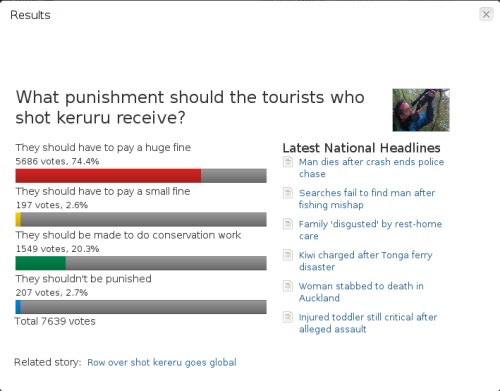In the USA, the Spotted Owl evokes the spectre of trivial busybody environmentalism. This species has been extremely well propagandised by the forestry lobby and other anti-environmentalists as a symbol for “putting other species ahead of humanity”. But it is not so in New Zealand (although there is Powelliphanta augusta). For a hint of what the public response to Gerry Brownlee’s plan to mine Schedule 4 of the conservation estate could be like, look no further than the firestorm which has erupted over the YouTube video showing Norwegians shooting protected native birds, among other things.

This has been a pretty persistent story. It’s been at or close to the top of the Stuff “most read” list for going on three days now; at the time of writing, it’s #1. It’s third on the NZ Herald website’s NZ section. It was in almost every dead-trees paper with a national news focus in the country on Friday. It’s featured prominently on One and 3 News (and consequently RadioLIVE), Radio NZ National, Newstalk ZB, and is at present the third-placed story on English-language Norwegian news website News and Views from Norway and has made Norwegian-language mainstream news there too, as well as action from Norway’s own environmental agencies. It’s drawn outraged official comment from DoC and the Conservation Minister; but notably not (as far as I can see) from the Minister of Tourism. There are 400-plus infuriated comments on the original YouTube clip, and 300-plus on the Fish’n’Hunt Forum, the oldest and most popular NZ internet site for discussion of hunting and fishing topics. Stuff.co.nz has a poll up, and the results are quite clear, for what they’re worth:

This outpouring of righteous fury has not come about because of the death of a few birds. None of the species shot by these hunters are so close to extinction that the loss of an isolated handful of individuals will critically harm the population. The reason for the response is that this sort of thing offends us deeply and personally. It is antithetical to who we are as New Zealanders, and it is as if a little part of each of us dies with those birds.
I wrote a few days ago that the task for the opposition, for conservationists and those who love the land and its wildlife was to relegate mining Schedule 4 to the “political too-hard basket”. More specifically, that task for those people — and for the 74% of (notoriously reactionary) Stuff respondents for whom these events are a grave injury — is to see the proposal to mine Schedule 4 as the same thing on a much greater scale, which it ultimately is, and to respond in kind.
Update 30 March: A vivid event like the one discussed above often primes the media and public to pay closer attention to similar events which previously might not have been newsworthy. Dog attacks are a case in point. So it is with this case: the release and eventual death of a weka, hardly endangered but well-loved, from Hagley Park, is now news.
L


